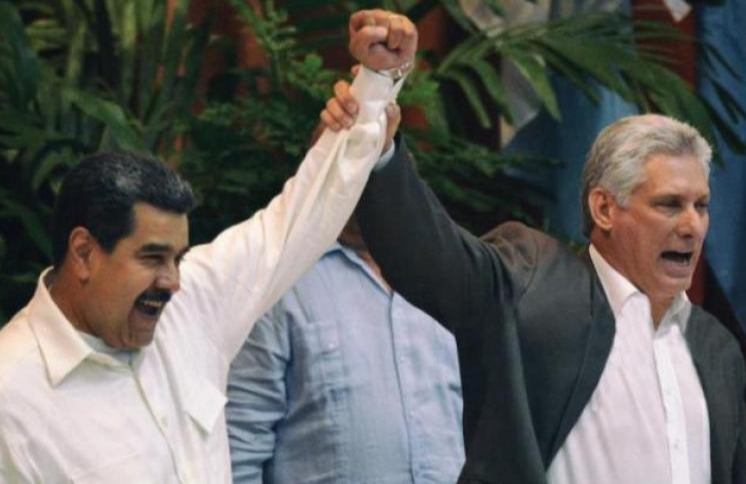
President Miguel Diaz-Canel (R) congratulates himself on the victory won at the polls by the pro-government
Great Patriotic Pole. Photo: File/AFP
By Guillermo Alvarado
The regional elections held on Sunday in Venezuela represented an important victory for the government of the Bolivarian Revolution, headed by President Nicolás Maduro, and showed the fragility and disunity of opposition groups.
Throughout the country, Chavista candidates for governorships won 20 out of 23 states, which improves the results obtained in the 2017 elections, when 18 local administrations were conquered.
In the midst of the strong political and economic onslaught of the U.S. government, supported by some of its servants in the region, this triumph demonstrated the mobilization capacity that Maduro's government has and the support it receives from the people.
According to the President, this was possible due to the systematic work, perseverance and righteousness of the militants of the United Socialist Party of Venezuela, to which should be added the wisdom of its leadership to overcome all difficulties.
In addition to the results, it should be noted that the elections were carried out with transparency and fluidity.
Even the head of the European Union observer mission, Isabel Santos, acknowledged on the ground that the minor difficulties encountered at the beginning of the voting were immediately resolved and that people were able to vote with ease and tranquility.
The presence of this group, absent during the last 15 years of Venezuelan elections, was demanded by the opposition parties.
For the opponents of the Bolivarian Revolution the result was meager, with victories in only 3 states, Cojedes, Nueva Esparta and Zulia.
According to some analysts, this was the result of the obstinate behavior shown during recent times, determined to sabotage the electoral processes, with repeated calls for abstention.
Now that they finally decided to participate in the race for the elections, they did it in a dispersed order and with strong contradictions among them for the nomination of candidates.
In practice, the opposition discourse has not succeeded in making a dent in the Venezuelan population's mood and this was demonstrated.
It is a good example for those, in our continent or in Europe, who anticipate to disqualify the elections in some countries and even say that they do not recognize their results, as if they, and not the people, were the ones who have the power to decide. The colony, they forget, ended two centuries ago.

